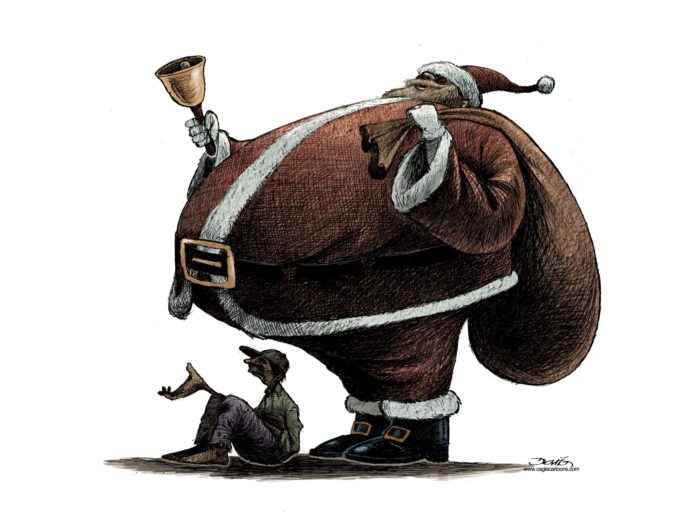BY DAVID PERRYMAN
 Christmas is coming and the goose is getting fat. Time to put a penny in the old man’s hat. If you haven’t got a penny, then a half penny will do. If you haven’t got a half penny, then God Bless You.
Christmas is coming and the goose is getting fat. Time to put a penny in the old man’s hat. If you haven’t got a penny, then a half penny will do. If you haven’t got a half penny, then God Bless You.
Christmas is coming and the season means many different things to different people. My memories of the winter school break are of traveling between our house and our grandparents to the east and our grandparents to the west. Before the interstate highway system that meant traveling nearly five hours on an old partially paved Oklahoma State Highway 9.
The holiday meant seeing cousins. It meant getting hugs from my Grandmother and eating those special Christmas cookies that no one else remembers and I cannot recreate.
Visits to grandparents who were born in the 1890’s gave my siblings and me fleeting glimpses at what normal was to an earlier generation. Outhouses, corn cribs, well buckets, milk cows and chicken coops were things of necessity.
One set of my grandparents actually had a bathroom in the house, but it could only be accessed from a screened-in back porch and seemed to have been added as an afterthought, particularly on cold December mornings.
My grandparents are the generation whose sons and daughters went to World War II or worked in factories in support of the war effort. They are the generation that stopped turning the crank on the old Daisy churn that is now one of my Mom’s prized possessions.
They and their contemporaries were the last to slice cabbage into homemade sauerkraut and pack it in the old four-gallon crock that Mom now uses as a vase filled with stalks of wheat.
They are also the generation that predominately evolved from a lifestyle of extended families to nuclear families. The 1950s and ‘60s signaled the end of an era of cohabitation of each generation with the next. My family was no different. Both my father’s parents and my mother’s parents cared for their aged parents. Until the 1940’s and the following decade or two, seeing my grandparents meant seeing my great-grandparents.
In many cases, living arrangements were based totally on economic conditions. Prior to the enactment of the Social Security System, most elderly Americans had absolutely no alternative but complete reliance on their children. Almost 80 years ago, President Franklin Delano Roosevelt declared that Social Security would provide “protection against the hazards and vicissitudes of life.” Because of Social Security, 14 million elderly Americans this year are lifted out of poverty.
While there are virtues to having extended families under a single roof, the autonomy and independence that the Social Security system has helped generations of retirees enjoy is without doubt the most successful and effective income security program in our nation’s history. Without Social Security, nearly half of elderly Americans would live below the poverty line; instead, only 10% do.
Social Security is especially important to seniors of color, who are less likely than white retirees to have private retirement benefits or asset income. Nearly half of Latino and African American seniors rely on Social Security for more than 90% of their income, compared with 30% of elderly white beneficiaries.
Although Social Security retirement income is very modest and most retirees are not living high on the hog, reducing or eliminating this essential income source would leave millions of seniors effectively penniless and dependent on their working-age children for food and shelter.
In addition to supporting the Social Security system, it is imperative that we remember this time of year to support the food banks in our communities and the senior nutrition centers as well as the many churches and civic clubs that provide benevolence to our needy. It is indeed time to put a penny in the old man’s hat.
Recently, I learned that groups like the Rotary, Optimist and Lions Clubs and, sometimes, Masonic lodges must pay sales taxes even though they are 501(c)(3) organizations.
For instance, over the Thanksgiving holiday, the Anadarko Kiwanis Club engaged in a great project delivering food boxes to the elderly and needy. The club was required to pay sales tax on turkeys that were purchased to be distributed.
One of the bills that I have introduced for the 2014 legislative session will prevent these benevolent and charitable civic organizations from having to pay sales tax on items purchased for distribution or donation to the needy. My legislation will make the donations and funds raised by these organizations go further and help more.
I have such great memories of spending Christmases with grandparents and aunts and uncles and cousins. Playing games together and sleeping nights in a house full of relatives, covered by quilts made by generations of ancestors.
I am happy that my grandparents were able to live an independent life supplemented by Social Security and Medicare. They did not want to be a burden on my parents. No one wants to be a burden on their children.
Speak up and defend these social programs that have made life better for our parents and can and will make life better for us and for generations to come.
It is the prayer of our family that you and your family are blessed this Christmas and that you are safe and secure and are able to make precious memories with loved ones. Please join our family in remembering members of the military and their families who will be separated over the holidays.
– David Perryman, a Chickasha Democrat, represents District 54 in the Oklahoma House of Representatives







